Add this eBook to your basket to receive access to all 54 records. Our indexes include entries for the spelling burel. In the period you have requested, we have the following 54 records (displaying 1 to 10): These sample scans are from the original record. You will get scans of the full pages or articles where the surname you searched for has been found. Your web browser may prevent the sample windows from opening; in this case please change your browser settings to allow pop-up windows from this site. Grantees of royal lands and pardons
(1175-1176)
The Great Rolls of the Pipe are the central record of the crown compiling returns of income and expenditure from the sheriffs and farmers of the various English counties or shires. This is the oldest series of public records, and the earliest surviving instances of many surnames are found in the Pipe Rolls. This is the roll for the 22nd year of the reign of king Henry II, that is, accounting for the year from Michaelmas 1175 to Michaelmas 1176. Most (but not all) of the entries in which names appear relate to payments for grants of land and fines or pardons. The large number of payments of fines for forest transgressions has been interpreted as a form of compounding for pardons by those who had rebelled during the recent years of unrest; or, looking at it in a different way, a form of extortion from the king in order to raise money to pay off the mercenaries with whose help he had quelled the rebellions. There is a separate return in each year for each shire, the name of the shire being here printed at the top of each page. Wales was still independent, in separate kingdoms, at this period, and is not included, except for 'Herefordshire in Wales'. | Sample scan, click to enlarge
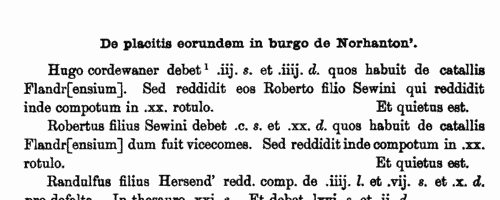
| Grantees of royal lands and pardons
(1176-1177)
The Great Rolls of the Pipe are the central record of the crown compiling returns of income and expenditure from the sheriffs and farmers of the various English counties or shires. This is the oldest series of public records, and the earliest surviving instances of many surnames are found in the Pipe Rolls. This is the roll for the 23rd year of the reign of king Henry II, that is, accounting for the year from Michaelmas 1176 to Michaelmas 1177. Most (but not all) of the entries in which names appear relate to payments for grants of land and fines or pardons. The large number of payments of fines for forest transgressions has been interpreted as a form of compounding for pardons by those who had rebelled during the recent years of unrest. There is a separate return in each year for each shire, the name of the shire being here printed at the top of each page. Wales was still independent, in separate kingdoms, at this period, and is not included, except for 'Herefordshire in Wales'. | Sample scan, click to enlarge
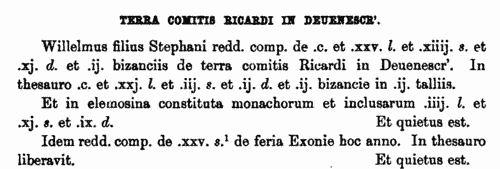
| Curia Regis Rolls
(1194-1199)
The Curia Regis, king's court, of mediaeval England took cases from throughout the country, and its records are among the most important surviving from this early period. This transcript of the rolls for October to December 1194 and October 1198 to July 1199 were edited by sir Francis Palgrave for the Commissioners of the Public Records. Most entries have the name of the county in the lefthand margin. | Sample scan, click to enlarge
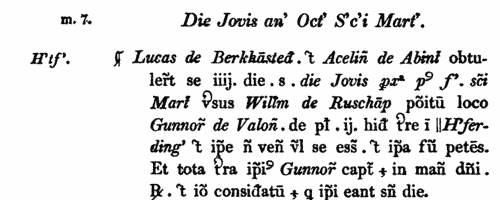
| Dublin Merchants
(1180-1200)
In 1870 documents of the Anglo-Normans in Ireland from 1172 to 1320, edited by J. T. Gilbert, Secretary of the Public Record Office of Ireland, were printed in the Rerum Britannicarum Medii Aevi Scriptores series. These include transcripts of the Dublin guild merchant rolls surviving from that period, which we have now indexed. This, the earliest of these rolls, is damaged, but can be dated to about 1180 to 1200. Those named, although enjoying the privilege of trading in Dublin, were not necessarily resident there, and in several cases a name will be followed by an English address, such as 'de Wigornia' (from Worcester). | Sample scan, click to enlarge
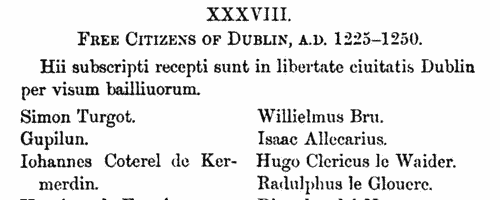
| Curia Regis Rolls
(1210-1212)
The Curia Regis, king's court, of mediaeval England took cases from throughout the country, and its records are among the most important surviving from this early period. | Sample scan, click to enlarge

| Norfolk Feet of Fines
(1192-1214)
Pedes Finium - law suits, or pretended suits, putting on record the ownership of land in Norfolk | Sample scan, click to enlarge

| Curia Regis Rolls
(1219-1220)
The Curia Regis, king's court, of mediaeval England took cases from throughout the country, and its records are among the most important surviving from this early period. Rolls 71 and 71B for Michaelmas term of the 3rd and 4th years, and 72 and 73 for Hilary term and Easter term of the 4th year of the reign of king Henry III (Michaelmas 1219 to Easter 1220) were edited by C. T. Flower of the Public Record Office and published in 1938. Each entry is copied in full, the Latin extended from the abbreviated original, the personal and place names given as in the original; where these vary between duplicate rolls, variant spellings are given in the footnotes. The county of each case was marked in the margin in the originals, and this is shown in italics at the start of each entry in the printed edition. | Sample scan, click to enlarge

| Dublin Merchants
(1225)
In 1870 documents of the Anglo-Normans in Ireland from 1172 to 1320, edited by J. T. Gilbert, Secretary of the Public Record Office of Ireland, were printed in the Rerum Britannicarum Medii Aevi Scriptores series. These include transcripts of the Dublin guild merchant rolls surviving from that period, which we have now indexed. | Sample scan, click to enlarge
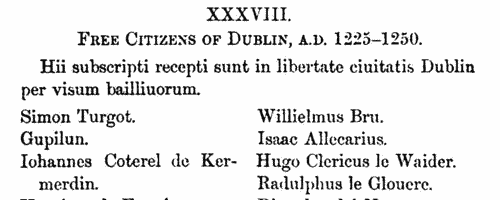
| Fine Rolls
(1216-1246)
The fine rolls of the 1st to 30th years of the reign of king Henry III record part of the government administration in England. These excerpts from the rolls list in transcript applications by plaintiffs for various writs (such as 'ad terminum' and 'pone') and for assizes to be held by the justices in eyre to look into their grievances. A fine of half a mark (6s 8d) or a mark (13s 4d) was usually levied; the cases are normally identified by county, and record that the appropriate sheriff had been notified. There are also more extensive records, in which more detail is given. The excerpts were made by the Record Commission and printed in 1835. | Sample scan, click to enlarge

| Liberate Rolls
(1245-1251)
These chancery liberate rolls of the 30th to 35th years of the reign of Henry III of England record the details of payments and allowances as part of the administration of government. Most entries start with the Latin words 'liberate', meaning 'deliver', or 'allocate', meaning allow. There are also 'contrabreves', warrants mainly to sheriffs of shires, assigning them tasks and allowing expenses. Most of the entries relate to England and Wales, but there are occasional references to Ireland and the English possessions in France. | Sample scan, click to enlarge

|
Research your ancestry, family history, genealogy and one-name study by direct access to original records and archives indexed by surname.
|











